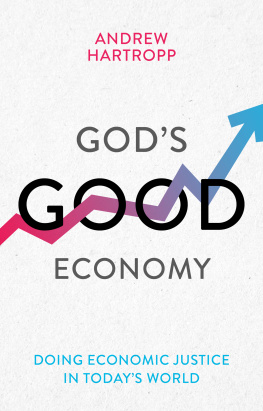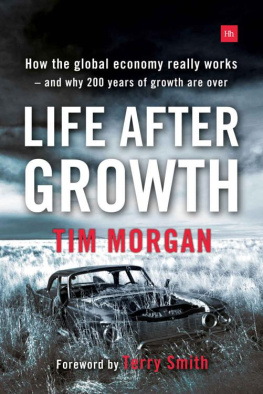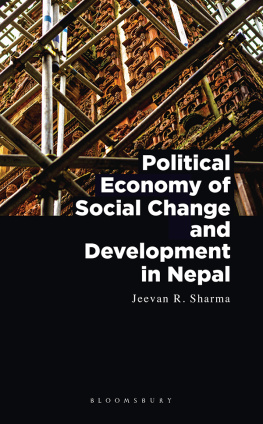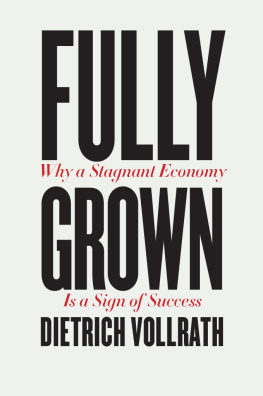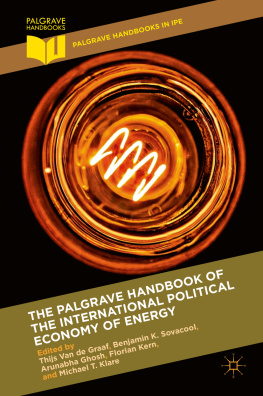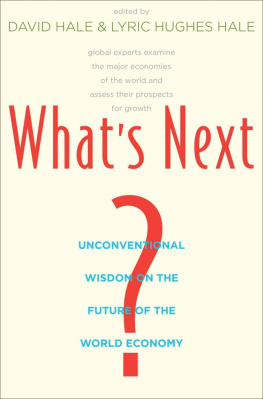Yes, Whats the Economy For, Anyway? is tremendously exciting, thought-provoking, and essential to thinking about our survival. But for me, its just plain fun to read! Ive always been the hedonist of the Simplicity movement, so I know when something is truly enjoyable. And this book is. Read and enjoy!
Cecile Andrews, author of Slow Is Beautiful and The Circle of Simplicity
This book raises many fundamental questions that are rarely asked. Why should be people be unemployed when there is work to be done? Why do economists tend to view income as being more valuable than vacations and other forms of leisure? Our view of the economy tends to be far too narrow. Whats the Economy For, Anyway? will help broaden our perspective.
Dean Baker, co-director, Center for Economic and Policy Research
By focusing on economic growth, we get misery in the USA. But the authors suggest another world is possible, one that would be better for all. We will all do better for following their advice to build a house of health and achieving the good life that lasts forever.
Stephen Bezruchka, M.D., University of Washington School of Public Health
Economics professors are good at answering how to questions, but not so good with what for? or so what? questions. This clearly and simply written book strikes a powerful blow for economic sanity by asking the main what for? questions, and giving cogent and specific answers. A wonderful voters guide on economic issues for the 2012 election and beyond!
Herman E. Daly, professor emeritus, School of Public Policy, University of Maryland
The economy should be for us, but its not. This smart, lively, and lovable book explains how we could move it in a happier and more sustainable direction.
Nancy Folbre, professor of economics, University of Massachusetts, author of The Invisible Heart
At a time when a lot of insane ideas are in danger of being enacted in Washington, D.C., including a frenzy of bills to fleece the middle class and further pamper our economic elite, this book asks the most fundamental question of all: What in hell is the economy for, if not for a good and sustainable quality of life for all? And it offers some fresh ideas for economic progress based on common sense and the common good. Read, absorb, and take action!
Jim Hightower, former Texas agriculture commissioner and author of Swim Against the Current: Even a Dead Fish Can Go With the Flow
You get what you measure. De Graaf and Batker demonstrate clearly and powerfully that getting an economy that works for us begins with getting clear on we really want.
David C. Korten, author of Agenda for a New Economy: From Phantom Wealth to Real Wealth and When Corporations Rule the World
With our economy tattered and listing, its an excellent moment to ask basic questions: What should we be aiming for as a society, and whats necessary to get there? Happily, other parts of the world provide many of the answers, as John de Graaf and David Batker show in this extremely valuable volume.
Bill McKibben, author of Eaarth: Making a Life on a Tough New Planet
This urgently needed bookcovering a range of ageless issuesasks one of the most fundamental questions surrounding the evolution of human societies and personal life: What should an economy most significantly do? To these authors, the answer for the United States is more clearly than ever not about facilitating more work days and more buying power. Rather, it is about creating more freedom and more time for its citizens to live their lives with basic security, balance, and richness. De Graaf and Batker seek to restore common sense and vision, and to provide worthy practical guidelines for changes in the U.S. socioeconomic system. Together they offer new and vital hope as hopelessness seems sadly on the rise.
David Mick, Ph.D., professor of marketing, University of Virginia
Whats the Economy for, Anyway? informs, entertains, and inspires while it explains the dismal science so ordinary people like you and me can see what a bill of goods weve been sold about the economy. Weve given allegiance to a false financial god that promised us prosperity, delivered for a while and then told us not to worry, to keep the faith as debt piled up, people lost their homes, the average work week ballooned far beyond forty hours (if you have a job), and the basics of the social safety net were threatened. This book not only shows whats happened in broad terms, it offers specific, humane, common sense policies!
Vicki Robin, coauthor, Your Money or Your Life
Since the financial collapse of 2007, snake-oil peddlers have diverted the economic conversation into misguided answers and the wrong questions. Charlatans, beware! De Graaf and Batker have produced a powerful antidote. Their combined expertise on issues of happiness, time use, ecology, and economic alternatives permeates the pages of this breezily written, inspiring, and common-sense account of what really yields true economic well-being.
Juliet B. Schor, author of Plenitude , Born to Buy , and The Overworked American
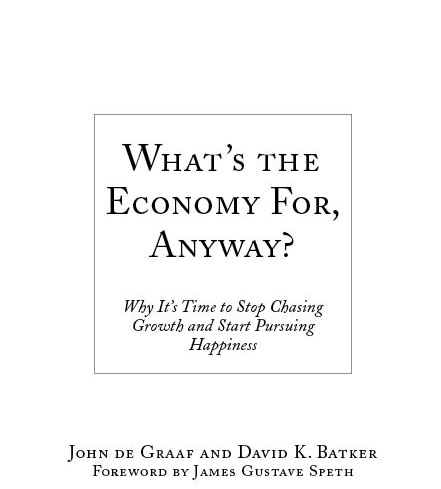

Copyright 2011 by John de Graaf and David K. Batker
Foreword copyright 2011 by James Gustave Speth
All rights reserved. No part of this book may be reproduced or transmitted in any form or by any means, electronic or mechanical, including photocopying, recording, or by any information storage and retrieval system, without permission in writing from the publisher.
For information address Bloomsbury Press, 175 Fifth Avenue, New York, NY 10010.
Published by Bloomsbury Press, New York
LIBRARY OF CONGRESS CATALOGING-IN-PUBLICATION DATA
De Graaf, John.
Whats the economy for, anyway? : why its time to stop chasing growth and start pursuing happiness /
John de Graaf and David K. Batker.
p. cm.
1. United StatesEconomic conditions. 2. Economic developmentUnited
States. 3. HappinessUnited States. I. Batker, David. II. Title.
HC103.D38 2011
330.973dc23
2011017438
First published in the United States by Bloomsbury Press in 2011
Electronic edition published in November 2011
eISBN: 978-1-60819-514-5
www.bloomsburypress.com
To Herman E. Daly, whose ideas provide the foundation for a twenty-first-century economics.
In memory of Jonathan Rowe (19462011), a brilliant advocate of new ways to measure progress.
Contents
As cofounder of the Natural Resources Defense Council and the World Resources Institute, as a civil servant, and more recently, as dean of the Yale School of Forestry and Environmental Studies, I have watched the erosion of our environment and particularly our growing climate crisis with deep concern. It has become clear to me that these crises are exacerbated by the basic way we have organized our economy and made a priority of its growth above all else. Many potentially effective solutions to climate change are rejected because of their perceived impact on the economy. We find ourselves today in a strange place where in order to stave off a planetary catastrophe, saving the planet from climate disruption, we must show that it will not hurt the economy.
In the climate context and otherwise, our quality of life is being steadily sacrificed to a single goalgrowth of the Gross Domestic Product, or GDP. It is time that Americans thought more deeply about this goal and its limitations.
This book brings a fresh and needed perspective to our common efforts by asking a simple but essential question: What is our economy for, anyway? It answers that question in a manner originally suggested by Gifford Pinchot, first chief of the U.S. Forest Service and a former Yale Forestry dean himself.
Next page

